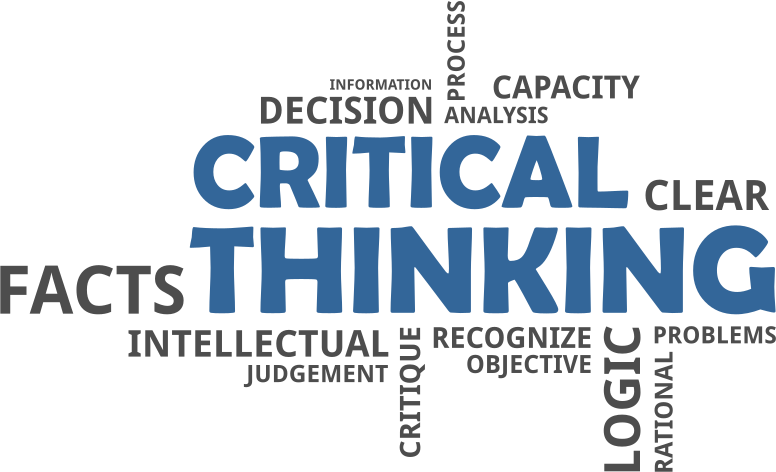CRITICAL THINKING

Enquire Now
WHAT IS CRITICAL THINKING
Critical thinking is the capacity to analyze, evaluate, and interpret information rationally and objectively. It encompasses a variety of skills, such as the ability to recognize and evaluate arguments, identify and address any potential biases and presumptions, and draw logical inferences from evidence and reasoning. Those proficient in critical thinking approach problems and challenges with a considered and analytical approach rather than relying solely on intuition or personal beliefs. They can collect, analyze, and evaluate information from various sources and apply it to make informed decisions and effectively resolve problems. Critical thinking is a fundamental skill in multiple areas, such as business, education, health, and science, which can be enhanced through practice and experience.
WHY IS CRITICAL THINKING IMPORTANT
Critical thinking assists individuals in developing necessary thinking skills, which are essential for analyzing information, identifying biases and presumptions, and the decision-making process. In the current information-driven, rapidly evolving world, where vast information is available, thinking critically is essential for success. A critical thinking coach can help individuals approach problems more systematically, objectively assess evidence, and consider various perspectives before deciding. Critical thinking can assist individuals in overcoming cognitive biases, enhance their ability to solve problems, and enable them to make better decisions in both personal and professional life.
HOW CAN YOU ACQUIRE CRITICAL THINKING TRAINING
Acquiring critical thinking training can be achieved in various ways, depending on individual requirements and preferences. Many individuals, such as university students, community college students, and those enrolled in online platforms, can attend a course or workshop specifically designed for critical thinking. These courses and seminars can provide a structured and comprehensive approach to critical thinking. Alternatively, individuals may seek a Critical Thinking Coach or Mentor who can provide individualized coaching and support. A Critical Thinking Coach can help individuals identify areas where they need to improve their thinking process, provide feedback, and recommend strategies for improving their critical thinking abilities. Furthermore, various online resources can assist in acquiring and practicing necessary thinking skills, such as Articles, Videos, and Interactive Exercises. Activities such as puzzle-solving, data analysis, and discussion of complex issues can also be beneficial in developing and honing critical thinking abilities.
ADVANTAGES OF LEARNING CRITICAL THINKING
Learning critical thinking offers a variety of advantages, both in personal and professional settings. Some of the benefits of learning critical thinking include:
- Critical thinking helps people reason, recognize their biases and assumptions, and look at evidence with an open mind, which can help them solve problems better.
- Critical thinking can help people break away from traditional thinking and develop new and creative ideas.
- Sound critical thinking can help you express your thoughts more clearly and accurately, and it can also help you listen to and think about other people’s ideas more objectively.
- Academic success: Critical thinking helps students analyze information better, ask pertinent questions, and make persuasive arguments.
TARGET AUDIENCE FOR CRITICAL THINKING TRAINING
Critical thinking training is designed to meet the needs of individuals from various backgrounds. It is particularly relevant to professionals responsible for making complex decisions, including those in management, executive, analytical, and research. However, it also applies to those who wish to improve their cognitive abilities and develop the capacity to think analytically, such as students, educators, and professionals in the legal, medical, and engineering fields. In other words, critical thinking training can be used to enhance problem-solving skills, evaluate information more critically, and make better-informed decisions.





